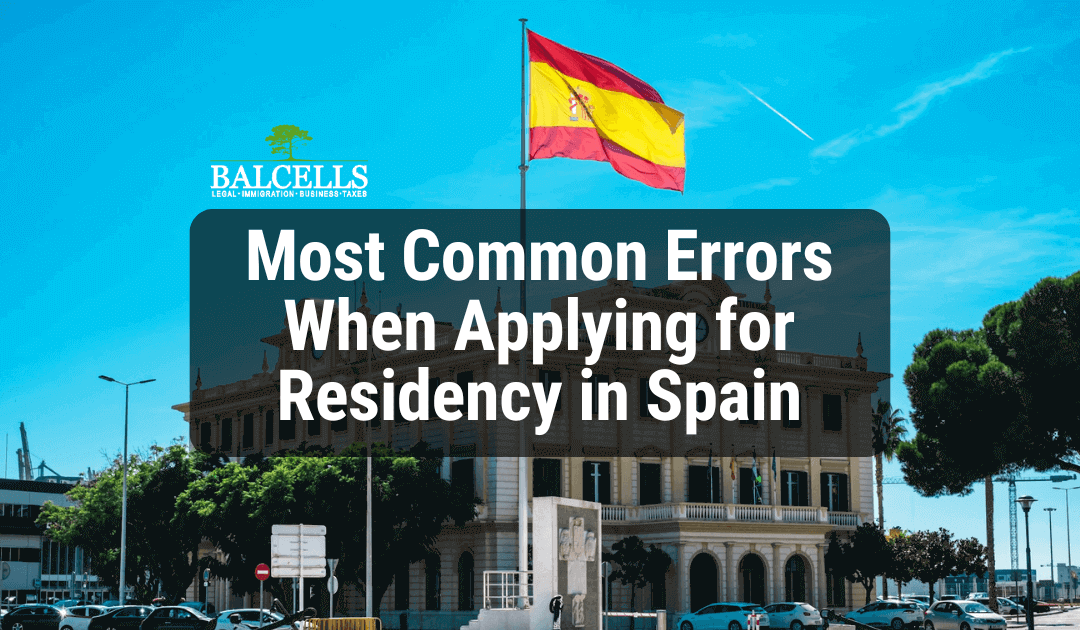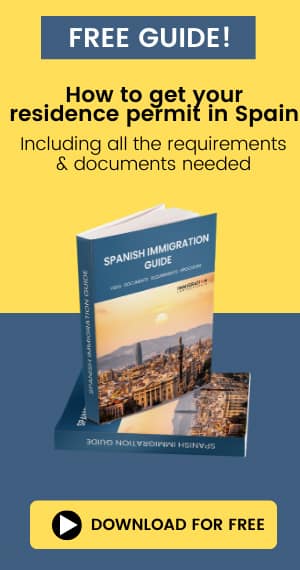After submitting countless applications and helping many clients through their immigration processes, our lawyers have created a list of the 8 most common errors made by foreigners when applying for their residency in Spain. Don’t worry, all these mistakes can be avoided easily, and in this article, we’ll show you how to do it.
By knowing what not to do, you’ll steer clear of future rejections and having to appeal, which will save you time, effort, and money.
Let’s stay informed.
1. Submitting incomplete applications
The first common error is pretty straightforward: lacking necessary documents in your application.
Many times the foreigner submits his application with confidence that he has submitted a complete list of generic requirements. Only to find that the administration requests for additional documents due to an incomplete submission.
This can generally be avoided by staying informed and doing your research before applying. There are many official sources online that provide you with the various residence permit requirements and processes.
However, sometimes knowing the general requirements is not enough, especially since each consulate or embassy has its own specific requirements; and the criterion used by each immigration office also differs.
It might take talking to a professional about your personal situation to know exactly what you’ll need to submit to receive a positive resolution.
2. Submitting mistranslated documents
When submitting official documents, there are three things you must remember and consider.
The first is that all official documents must always be legalized and apostilled.
But that is not all.
The second thing is that those documents must always be translated to Spanish, including the apostille, which is why you must get it legalized and apostilled before getting it translated.
And, finally, bear in mind that a simple translation will not do the job. All documents must be translated by a sworn translator who is recognised by MAEC.
3. Submitting invalid documents
Submitting expired documents usually occurs when an individual obtains all required documents too early, so that when the application appointment arrives, some documents are no longer valid.
Criminal records certificates are an example of documents that are usually affected by this.
They are usually valid for up to 6 months from the date of issue, unless the document itself states otherwise. Hence, if that is the first thing you obtain, make sure to hurry up and submit all documents before their expiration.
On the other hand, another document with a deadline that may affect your application is the marriage certificate, which is only valid for 3 months.
Thus, as you can see, it is important to plan out when you obtain certain documents, and when your residency appointment is, so that your requirements are still valid.
4. Submitting a late application
Here it is important to note that each visa or residence permit procedure has different deadlines.
For example, you can apply for residence permits under the Entrepreneur’s Law (such as the Golden Visa, the Entrepreneur Visa, the Highly Qualified Worker’s Visa, or the Digital Nomad Visa), from within Spain.
But you can apply while on a tourist visa during the 90 days (within the 180 day period) that you are allowed to be in the Schengen Zone.
However, for the student visa, even though you can also obtain it as a tourist, you can only submit your application during your last 30 days as a tourist in Spain.
Thus, you need to know the deadlines for each permit because even if you meet all the requirements, not meeting the deadlines will get you rejected.
This also brings us to the Entry Declaration, which will be fundamental in checking how long you have been in Spain, and since when.
Making an entry declaration is necessary if your passport was not stamped when you entered Spain, most likely because you entered through another country in the Schengen Zone. You must do this within 72 hours from your time of entry into Spain.
5. Traveling to Spain without knowing the procedure and requirements
As we have just mentioned, there are some residence permits that you can apply for while you are in Spain on a tourist visa.
However, there are many others (such as the regular work permit or non-lucrative visa) that you can only apply for from your country of origin.
Hence, it is crucial to make sure you are aware of these rules before traveling in order to avoid the need to go back to your country of origin to submit your application or even to gather an additional document that was missing.
On the other hand, if you are sure you can apply directly from within Spain, you must remember that you only have 90 days to do so. Sometimes this is not enough time to complete everything if you are starting from scratch in Spain with zero planning ahead.
So, before going to Spain, know what the process entails and which documents you might need. There are certain requirements you can prepare beforehand. By doing this you will save time, avoid stress, and up your chances of getting residency.
6. Not knowing the particularities of each immigration office
For each residence permit, yes, there are general requirements to be met, however, each immigration office has its own way of doing things and its own criteria.
This does not just pertain to how long each immigration office takes to process an application, but also to the requirements themselves.
Some immigration offices might require a document or extra demonstration that other offices do not.
For instance, in the case of the EU Family Member card, most immigration offices usually require the applicant to demonstrate private health insurance, but the one in Barcelona usually does not.
That is why knowing the discrepancies between different immigration offices can make or break your application.
7. Traveling outside of Spain before having the physical residency card
Another common mistake that foreigners make is traveling out of Spain before getting their TIE (a.k.a. the physical foreigner’s residence card).
Even if you have already received a positive resolution, you must not travel outside of Spain if you do not have your residence permit card yet because you may have difficulty returning.
If you need to travel back to your home country, you can request an autorización de regreso (return authorization) to present at the airport once you come back.
8. Having a criminal record
Finally, the last mistake is not having a clean criminal record. Having criminal records would most likely result in a rejection, so it would help a lot to cancel any offenses before applying (which is a legal procedure you can carry out).
Additionally, it is important that you have clean records in all the countries you have resided in in the last 5 years.
In certain cases, such as with residence permits under the Entrepreneur’s Law, authorities might consider just the last 2 years.
Are you not entrusting your application to an immigration lawyer?
Now you have the 8 most common errors that foreigners commit when applying for Spanish residency.
However, before we go, we have one more small one to share… Another mistake that could result in a rejection is not getting the help or guidance of an immigration lawyer.
Not only are our immigration lawyers always eager to help you, they are also experienced and know the nuances of each residence permit and each immigration office.
So if you would like to enjoy a stress free and successful application, we are here to help!
We will understand your situation, and figure out the best way to approach it together so that you can move to Spain with ease.
Book a consultation with one of our lawyers and we’ll answer all your questions:



